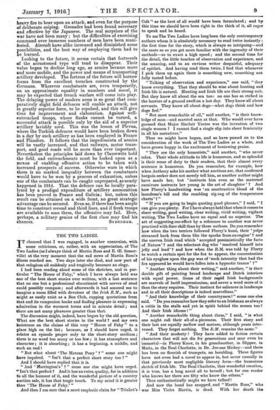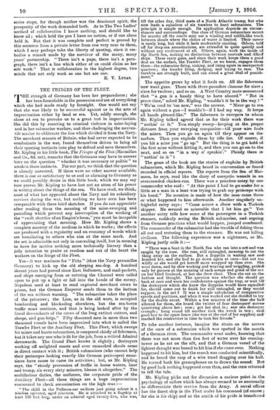THE TWO LADIES.
IT chanced that I was engaged, in another connexion, with some criticisms, or, rather, with an appreciation, of The Two Ladies (as 'always think of Martin Ross and E. (E. Somer- ville) at the very moment that the sad news of Martin Ross's illness reached me. Two days later she died, and now part of that eulogium all suddenly and tragically becomes an elegy.
I had been reading aloud some of the sketches, and in par- ticular " The House of Fahy," which I have always held was ene of the best short stories ever written, with a last sentence that no one but a professional elocutionist with nerves of steel could possibly compass ; and afterwards it had amused me to imagine a room filled with devotees of the Irish R.M., such as might as easily exist as a Boz Club, capping quotations from that and its companion books and finding pleasure in expressing admiration in the warmest terms and in minute detail ; and there are not many pleasures greater than that.
The discussion might, indeed, have begun by the old question, What are the best short stories in the world ? and my own insistence on the claims of this very " House of Fahy " to a place high on the list ; because, as I should have urged, it relates an episode proper only to the short-story medium ; there is no word too many or too few ; it has atmosphere , and character ; it is absorbing ; it has a beginning, a middle, and such an end !
" But what about The Maroan Pony ' ? " some one might have inquired. " Isn't that a perfect short story too ? "
And I should have replied that it is.
" And Harrington's ? " some one else might have urged. "Isn't that perfect ? And it has an extra quality, for in addition to all the humour of it, and the wonderful picture of a country auction sale, it has that tragic touch. To my mind it is greater than The House of Fahy.' "
And then I am sure that a most emphatic claim for " Trinket's Colt'; as the best of all would have been formulated ; and by this time we should have been right in the thick of it, all eager to speak and be heard.
To me The Two Ladies have long been the only contemporary authors whom it is absolutely necessary to read twice instantly : the first time for the story, which is always so intriguing—and the more so as you get more familiar with the ingenuity of their methods—as to exact a high speed ; and the second time for the detail, the little touches of observation and experience, and the amazing, and to an envious writer despairful, adequacy of epithet. And having read them twice, I find that whenever I pick them up again there is something new, something not fully tasted before.
" Talking of observation and experience," one said, " they know everything. That they should be wise about hunting and Irish life is natural. Hunting and Irish life are their strong suit. But they know all about the sea too: no one has so etched in the horrors of a ground swell on a hot day. They know all about servants. They know all about dogs—what dogs think and how dogs feel."
" But most remarkable of all," said another, " is their know- ledge of Man—and married man at that. Who would ever have guessed that Major Sinclair Yeates was the invention of two single women ? I cannot find a single slip into sheer femininity in all his narratives."
Thus we might have began, and so have passed on to the consideration of the work of The Two Ladies as a whole, and have grown happy in the excitement of bestowing praise.
" They are the only humorists," said another, " who never relax. Their whole attitude to life is humorous, and so splendid is their sense of duty to their readers, that their almost every sentence is humorous. Do you remember, for example, how when Anthony asks his mother what auctions are, that confirmed bargain-seeker does not merely tell him, as another author might have made her, but instructs him even as the maternal carnivore instructs her young in the art of slaughter' ? And how Flurry's handwriting was an unattractive blend of the laundress's bill and the rambling zig-zag of the temperature charts' ? "
" If you are going to begin quoting good phrases," I said, " I can give you plenty. For I have always held that when it comes to sheer writing, good writing, clear writing, vivid writing, vigilant writing, The Two Ladies have no equal and no superior. The art of suggesting one effect by a reference to another was never practised with finer skill than by these authors. Do you remember how when the two terriers followed Flurry's hunt, their yelps streamed back from them like the sparks from an engine' ? and the uneven Irish road which accepted pessimistically the facts of Nature' ? and the reluctant dog who resolved himself into jelly and lead' ? and how when the R.M. was told by Flurry to watch a certain spot for the fox to appear, the concentration of his eyeglass upon the gap was of 'such intensity that had the fox appeared he would have fallen into a hypnotic trance' ? "
" Another thing about their writing," said another, " is their double gift of painting broad landscape and Dutch interiors with equal power. Some of their rapid Irish backgrounds are marvels of lucid impressionism, and never a word more of it than the story requires. Their instinct for saliences in landscape and in all their descriptions is indeed marvellous."
" And their knowledge of their countrymen !" some one else said. "Do you remember how they refer to an Irishman as always a critic in the stalls and yet in spirit behind the scenes too ? And their Irish idioms ! "
" Another remarkable thing about them," I said, " is what one might call their all-of-a-pieceness. Their first story and their last are equally mellow and mature, although years inter- vened. They forget nothing. The R.M. remains the same."
" And their modesty ! They have added to fiction certain characters that will not die for generations and may even be immortal—in Flurry Knox, in his grandmother, in Slipper, in Maria, in the Real Charlotte, in Dr. Jerome Hickey—and there has been no flourish of trumpets, no heralding. These figures have not even had a novel to appear in, but occur casually in that previously most negligible literary form—the humorous sketch Of Irish life. The Real Charlotte, that wonderful creation, it is true, has a long novel all to herself ; but for one reader who knows her there are fifty who know the others."
Thus enthusiastically might we have talked !
And now the bond has snapped, and " Martin Ross," who was Miss Violet Martin, is dead. With her death the series stops, for though neither was the dominant spirit, the prosperity of the work demanded both. As to The Two Ladies' method of collaboration I know nothing, and should like to know all ; which held the pen I have no notion, or if one alone held it. But that it was complete and perfect is proved by this sentence from a private letter from one very near to them, which I may perhaps take the liberty of quoting, since it em- bodies a remark made by the survivor of the many, many years' partnership. " There isn't a page, there isn't a para- graph, there isn't a line which either of us could claim as her sole work." That is collaboration in the highest degree, two minds that not only work as one but are one.
E. V. Lucas.











































 Previous page
Previous page